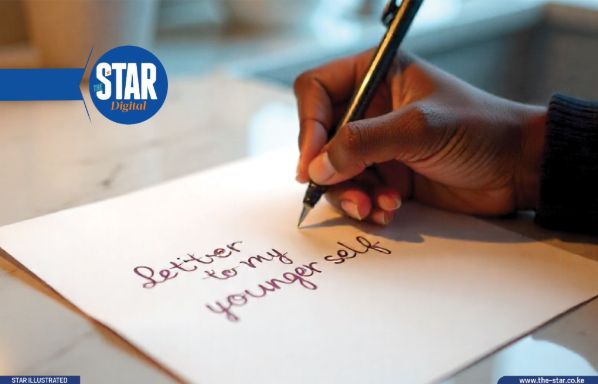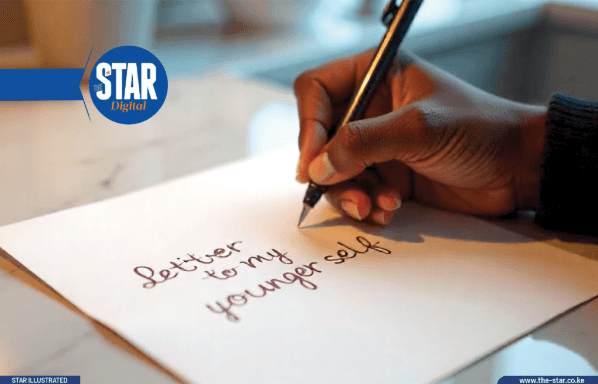

Every scar has a story. “Letter to My Younger Self” invites you into the reflective hearts of people who've walked winding roads—offering gentle truths, bold lessons, and encouragement for anyone still figuring it out. These weekly letters are full of grace and grit, showing how setbacks shape wisdom and how the past still holds power to teach. From nurturing curiosity to embracing mentorship, each piece is a tribute to growth through lived experience.
George Nyambu* (not his real name) pens this week’s heartfelt Letter to My Younger Self.
Dear younger self, If I could sit across from you today, I’d probably start by saying, “I understand why you chose journalism.” You wanted to tell stories that mattered, to shine a light in dark places, to give ordinary people a voice. But I must tell you what I wish someone had told me: that nobility doesn’t pay the rent, and sometimes, it doesn’t even protect your life.
There’s a quote by the slain Sri Lankan Sunday Leader Newspaper editor Lasantha Wickrematunge that will stay with you forever. He wrote, “No other profession calls on its practitioners to lay down their lives for their art save the armed forces and, in Sri Lanka, journalism.”
You will come to know that journalism here, too, can cost more than you’re prepared to give. When you first read that, you thought it was melodramatic.
Now, you understand. Because while Kenya may not be Sri Lanka, the shadows are familiar—the intimidation, the phone calls after midnight, and the quiet warnings to “go slow on that story.” When you join the newsroom in 2016, it will still feel like a temple—noisy, chaotic, but sacred. The air will hum with purpose. You believed in truth, and you believed in words.
You thought the pen was the most powerful tool anyone could ever wield. It felt like you were stepping into your destiny. Yet, over the years, you will watch that temple crumble brick by brick. Media houses will bleed out their best people. Editors you once admired will be forced out, and idealists will trade their truth for survival.
Sometimes it won’t even be violence that kills journalism—it will be hunger, disillusionment, or fatigue. You’ll start to notice that even the bravest voices are quieter now. I still remember the rush of those early days—the clatter of keyboards, the ringing phones, and the chaos of breaking news.
Editors shouting across the room, deadlines breathing down your neck, the thrill of seeing your byline printed for the first time. You felt alive. Every assignment was a new adventure, every headline a small victory. But if I could whisper something into your ear back then, it would be this: this love affair won’t last forever.
You see, journalism will give you meaning, yes, but it will also test you in ways you can’t imagine. You’ll give it your time, your energy, your weekends, even your peace. And in return, it will give you experience, maybe even recognition, but not always stability. The same newsroom that felt like home will one day start to feel like a battlefield. Over the years, you’ll watch colleagues walk away, some laid off, others broken by burnout.
You’ll see the media houses you admired shrinking their teams, cutting corners, and chasing clicks instead of truth. You’ll watch talented storytellers trade their notebooks for corporate press releases just to survive. And slowly, you’ll start to wonder if passion alone can pay rent or buy food. I’m writing to you now from that point of wondering.
If I could go back, I think I’d tell you to seriously consider studying law or software engineering or even urban development. Not because I stopped believing in storytelling, but because I’ve come to understand something I didn’t back then—dreams need foundations.
If I could talk to you again, I’d say: consider other paths too. Law. Software engineering. Both will give you the power to build, not just to tell. If you’d chosen law, you could still have defended justice, only this time with a brief instead of a broadcast. If you’d gone into software, you could have created the tools that help others tell stories safely and transparently.
If I had studied law, I’d still be telling stories, but from a different angle through justice, argument, and advocacy. I can picture myself standing in court, using words not just to report, but to fight for something tangible.
Law, after all, is another form of storytelling—one where truth has consequences. And if I had gone into software engineering, I’d have learned the language of the future. I’d be building, not just observing. Creating platforms for truth instead of depending on failing ones. I’d be at the intersection of technology and storytelling, where innovation meets information—the kind of place where journalism could still thrive in new forms.
Sometimes, I wonder why I didn’t see it when the career coach visited my school how fragile the media industry in Kenya would become. The endless layoffs, shrinking budgets, the rise of influencers shaping narratives through entertainment rather than evidence.
Maybe I was too caught up in the romance of it all, the belief that good work would always speak for itself. But now I know better: good work needs a system that values it, and that system is crumbling.
Still, I don’t want you to think I regret everything. Journalism has given me more than I could have imagined. It’s taught me empathy—how to truly listen to people and see beyond what they say. It’s taught me courage to stand my ground even when the truth is unpopular. It’s taught me resilience to start again after every story that falls apart.
I’ve seen humanity at its best and worst. I’ve interviewed grieving parents, defiant activists, corrupt officials, and hopeful dreamers. I’ve stood in floods, protests, and courtrooms. I’ve seen Kenya through a thousand eyes, and I carry those stories inside me like small pieces of who I’ve become.
That’s something no other profession could have given me. But as I grow older, I’ve learned that passion and purpose don’t have to live in the same house forever. Sometimes, you have to move on to survive. Sometimes, holding on too.
Everyone has a story worth sharing. If you’ve ever wished you could talk to your younger self—with wisdom, forgiveness, or clarity—we invite you to write to us. Your real, heartfelt letter might just be the encouragement someone else needs today. You may remain anonymous if preferred, but your truth matters. We don’t pay contributors, but we believe in the power of shared experience. Join us in building a collection of life’s hard-earned lessons and gentle reminders. Be part of this movement. Send your Letter to My Younger Self to: [email protected]


















